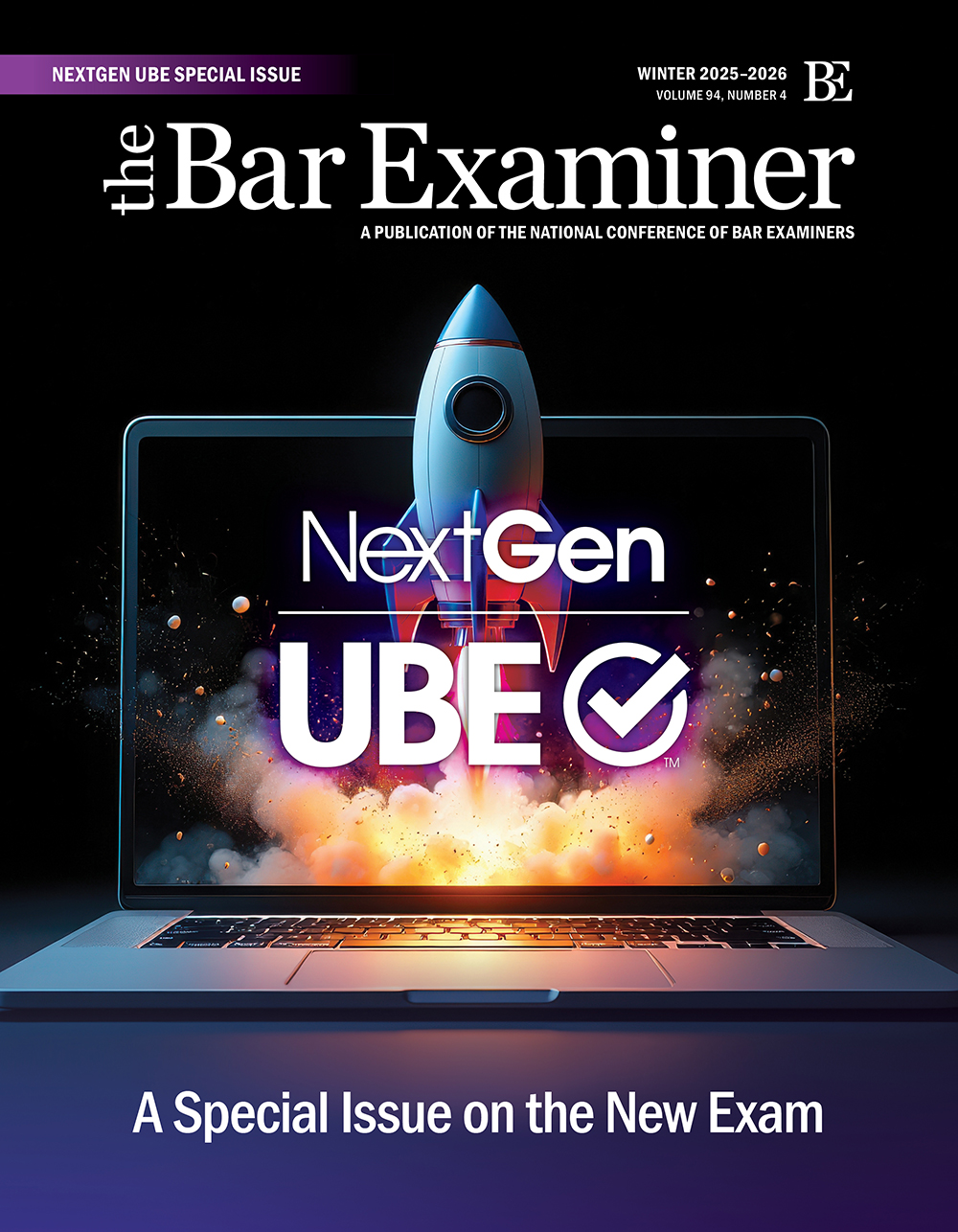This article originally appeared in The Bar Examiner print edition, September 2014 (Vol. 83, No. 3), pp. 4–5.
By Erica Moeser Recently the Iowa Supreme Court conducted a public hearing on bar admissions issues. The subjects of the hearing were whether Iowa should adopt the diploma privilege for its in-state law graduates, and whether Iowa should adopt the Uniform Bar Examination for testing candidates whose legal education occurs outside Iowa. Contemporaneously, a special commission in Kentucky is examining all aspects of bar admissions in anticipation of submitting a report to the Kentucky Supreme Court.
Recently the Iowa Supreme Court conducted a public hearing on bar admissions issues. The subjects of the hearing were whether Iowa should adopt the diploma privilege for its in-state law graduates, and whether Iowa should adopt the Uniform Bar Examination for testing candidates whose legal education occurs outside Iowa. Contemporaneously, a special commission in Kentucky is examining all aspects of bar admissions in anticipation of submitting a report to the Kentucky Supreme Court.
In both instances, questions arose that suggest that the nature and purpose of the National Conference of Bar Examiners are not fully understood. Written comments filed in Iowa indicated that NCBE is perceived as some company that sells tests. That is a less-than-apt description of what we are and what we do. Perhaps it is time for a reminder!
NCBE is a 502(c)(3) not-for-profit corporation that operates as a service bureau to state Supreme Courts and boards of bar examiners. Some jurisdictions have separate boards that handle character and fitness issues, and NCBE serves those, too.
Governance of NCBE is placed in the hands of a 12-person Board of Trustees, all of whom are drawn from a nationwide pool of individuals with strong track records in bar admissions, and a president (me). The current Board is composed of current and former state board members, bar admission administrators, and a liaison justice. They are drawn from across the country—from New Hampshire to Hawaii, with intermediate stops in New York, the District of Columbia, Georgia, Florida, Ohio, Minnesota, Iowa, Missouri, Arizona, and California. This varies as Trustees meet their term limits.
In addition, NCBE has a robust volunteer committee structure. For the 2014–2015 year, I count representation from 40 jurisdictions among the 81 people invited to serve on the following policy committees: Character and Fitness, Diversity Issues, Editorial Advisory, Education, Long Range Planning, MBE, MEE/MPT, MPRE, Technology, and UBE. In addition to the 12 jurisdictions noted above, this year committee members will come from Alabama, Alaska, Arkansas, Colorado, Connecticut, Idaho, Illinois, Indiana, Kansas, Louisiana, Maine, Maryland, Massachusetts, Mississippi, Montana, Nebraska, New Jersey, New Mexico, North Carolina, North Dakota, Oklahoma, Tennessee, Texas, Utah, Washington, West Virginia, Wisconsin, and Wyoming.
The four examinations that NCBE constructs for use by jurisdictions are crafted by 10 drafting committees, of which 7 cover MBE topics and the remaining 3 develop the MPT, MEE, and MPRE. The current composition of the drafting committees, with volunteers numbering 56, is drawn from the academy, the bench, and the private practice of law. Academics comprise 75% of the mix; federal judges and private practitioners account for 25%. Schools currently represented in our drafting effort include Arizona, Boston University, Brooklyn, Campbell, Catholic, Columbia, Cornell, Florida International, Fordham, George Washington, Georgia, Gonzaga, Harvard, Hofstra, Iowa, Marquette, Miami, Michigan, Missouri–Columbia, New Mexico, Northern Kentucky, Oklahoma, Santa Clara, Southern Illinois, Texas, Tulane, UC Berkeley, UC Davis, UC Hastings, Virginia, Wake Forest, Wayne State, and William Mitchell.
NCBE values diversity. Coincidentally, minority representation on both our policy committees and our drafting committees is roughly 20%. On the Board of Trustees, it is 25%.
The NCBE staff, now numbering about 80, all work in Madison, Wisconsin, at NCBE’s headquarters. Most of the growth of the organization has occurred in our Testing and IT Departments. Those newer to bar admissions may be unaware that over the past 12 years NCBE has brought all test development and scoring in-house. The only aspect of our testing program that is undertaken by an outside contractor is the test administration aspect of the MPRE. This is handled by the Law School Admission Council under a contract that went into effect in early 2013.
Principal revenue sources for NCBE are the four examinations (MBE, MEE, MPT, and MPRE) as well as the investigative services that we conduct for roughly half the jurisdictions, which send some or all of their applications to NCBE for verification.
NCBE devotes considerable resources to providing educational opportunities for the bar examining community and state courts, such as our Annual Bar Admissions Conference and our grading workshops, and to producing publications such as this magazine and the Comprehensive Guide to Bar Admission Requirements. NCBE is the clearinghouse for information about the bar examination to the state agencies and the public. And NCBE performs research for, and consulting services to, jurisdictions at no charge.
The NCBE website is a valuable resource for bar applicants as well as for the state boards. Our website has become the portal to secure sites for each applicant. NCBE has developed electronic applications that move work along more accurately and expeditiously than ever before.
NCBE performs its work with wholehearted commitment to the notion that by pooling resources we can offer high-quality test instruments and services worthy of the awesome and sobering responsibility that jurisdictions bear for making licensing determinations. NCBE is not “some company.” It exists solely to serve the jurisdictions, most of which lack the resources to go it alone.
Apropos of describing NCBE, I would like to announce that over the next year this organization will be undertaking a formal strategic planning initiative, the objectives of which are to assess what we are doing well, where we are coming up short, and how we might position the organization for the future. The study will commence with a survey that is intended to reach a fairly broad constituency with interest in bar examining. We expect to complete the task by the end of our fiscal year in June 2015.
In August NCBE’s leadership underwent its usual change at NCBE’s Annual Meeting in Minneapolis. Margaret Fuller Corneille of Minnesota (known to all as Peg) yielded the chair to Bryan Williams of New York. Peg and I have a long history stretching back almost three decades to when I was her Wisconsin bar administrator counterpart. She was an effective leader this year, as I knew she would be. Bryan, a lawyer in private practice in New York City, is the longest-serving member of the New York State Board of Law Examiners. He cut his teeth at NCBE with service on our MBE Committee and has been a valued volunteer for many years.
We also said good-bye to Franklin Harrison of Florida, our Immediate Past Chair (although he will continue to chair NCBE’s MBE Committee), and to Darryl Simpkins of New Jersey. Joining the Board are Judge Phyllis Thompson of the District of Columbia Court of Appeals and Gordon MacDonald, who chairs the New Hampshire Board of Bar Examiners. I look forward to working with them.
With NCBE’s characteristic dedication to mission and strong volunteer spirit, we hope to tackle strategic planning with verve. Those with ideas about how to make the organization even better are welcome to submit suggestions.
Contact us to request a pdf file of the original article as it appeared in the print edition.







